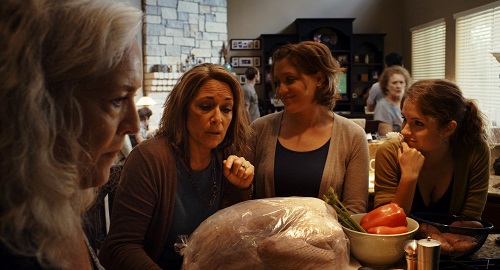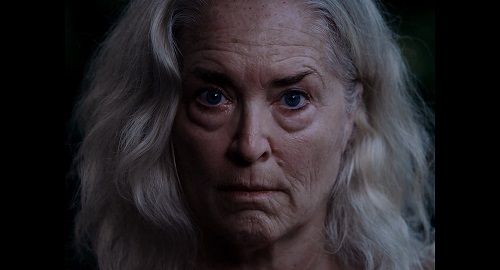Synopsis: Krisha returns for Thanksgiving dinner after ten years away from her family, but past demons threaten to ruin the festivities.
Release Date: March 25, 2016 MPAA Rating: PG-13
Genre(s): Comedy, Drama
Film Review

Production
Sometimes, the simplest of movies can also be the most powerful. That’s the case with Krisha.
Played by Krisha Fairchild (The Killing of John Lennon), the title character in Krisha is a recovering alcoholic who, desperate to reconnect with her estranged family, decides to attend a Thanksgiving dinner. The gathering is pretty typical of the holiday, with meat-headed men screaming at football games and caring women preparing all types of food. Trying to make amends with those whom she has neglected or wronged, Krisha moves from person to person, engaging in one awkward conversation after another. Unfortunately, as the day wears on, Krisha starts succumbing to the stress and her inner demons rear their ugly heads.

Writer/director Trey Edward Shults fleshed Krisha out from a short film that he did, also called “Krisha,” a couple of years ago. The feature length version stretches the fifteen minute film out into an hour and twenty-three minutes, and the extra meat helps; Krisha’s unravelling should be slow and gradual, and fifteen minutes isn’t enough time for it to play out that way. Eighty-three minutes is. Although the character-driven plot is very simple and more than a bit predictable, it’s also shocking and heartbreaking – at one point, one of the characters actually calls Krisha “heartbreak incarnate” (the same character calls her “disaster incarnate” a little later on, so maybe “incarnate” is his fifty-cent word). Much of the drama of the movie plays out in Krisha’s mind, but that’s what makes it so gripping – her mind is a fragile and shaky place, and the audience teeters on the edge along with her.
In the interest of full disclosure, I feel as if I should share the fact that I myself am a recovering alcoholic, so Krisha may have a different effect on me than it is going to have on the average viewer. Granted, I never had the same demons that Krisha deals with in the film, my family isn’t nearly as dysfunctional, and her rock bottom was way lower than my own, but, to me, Krisha is an instantly relatable character, although she probably won’t be for many viewers. So, while some may find Krisha’s third-act Joan Crawford-esque meltdown humorous (the movie is classified as a comedy-drama, after all), for me personally, it’s tragic.
But enough about me. Krisha is a very compelling film. Whether it’s compelling in the same way as a Shakespeare play or as a car accident is up to the viewer to decide, but the film should get some kind of a reaction, be it good or bad, out of everyone.

Cinematography
Krisha was shot by cinematographer Drew Daniels (All That Remains), who seems to be a good Emmanuel Lubezki to Trey Edward Shults’ Terrence Malick. In true Lubezki fashion, many of the shots are long takes, fly-on-the-wall-like surveillance of the different conversations and interactions within the gathering. The first scene in the film sets up the photographic style; it’s a follow shot of Krisha arriving at the home, ringing the doorbell, waiting for an answer that doesn’t come, stepping in mud as she looks for an opening, and finally finding her way in – all done in one long take, establishing not only the observational nature of the movie, but generating sympathy for Krisha long before the audience even knows if she deserves it or not. Another clever thing that Daniels does is change lenses as the movie progresses – as the story plods along and Krisha feels more and more tension and pressure from her family, the lenses get smaller and the shots get tighter, giving the audience the feeling that the world is, indeed, closing in on her. For such a simple movie, Krisha has some cool photographic things happening in it.

Directing
Trey Edward Shults is a Terrence Malick disciple, and in many ways, it shows. Although there is a screenplay for Krisha, it seems as if the script is more of an outline, as the movie has a very loose, improvisational style to it. The lead, Krisha Fairchild, is a professional actress with a handful of small credits, but she is also Shults’ aunt. But Shults didn’t stop there; he cast his own family in most of the roles (and almost always sharing a name with their character), and he himself portrays Krisha’s aspiring filmmaker son, Trey (so, essentially he plays himself). The few “real” actors in the cast, guys like Bill Wise (Boyhood) and Chris Doubek (Lovers of Hate), were given plenty of freedom with their parts, so between the natural chemistry of the family and the conversational vibe of the dialogue, the move has a very collaborative feel. One gets the feeling that Krisha is a very personal movie for Trey Edward Shults, and his choice to keep the production “in the family” helps communicate his intimate vision to the audience.


Sound
The sound in Krisha is nothing short of remarkable. The entire soundtrack, designed by Johnny Marshall (Upstream Color) and mixed by Michael Semanick (Crimson Peak, Gone Girl), seems to exist only inside Krisha’s head, with soft whispers that may be people in the next room talking, but also may be Krisha’s inner voices trying to derail her train of thought. The incidental music, courtesy of Brian McOmber (Stockholm, Pennsylvania), consists of weird, plucky pieces that, again, could very possibly just be sounding inside Krisha’s brain. The sound effects are very subtle, almost maddeningly quiet, which only adds to the mystique. There’s one very well-crafted scene in which the sound is essential; Krisha is debating whether or not she should privately pop open a bottle of wine and start drinking, and the soundtrack begins with crowd murmurs, rises up to applause, then at the final moment, the Nina Simone song “Just in Time” is played, with the songstress seductively crooning the line “you found me just in time.”. Of course, all of this is inside Krisha’s head, but that doesn’t make it any less real for her.and for us as we watch her. It’s said that sound is half the picture, and the audio team for Krisha makes the most of that half.
Cast and Crew
- Director(s): Trey Edward Shults
- Producer(s): Justin R. ChanChase JolietTrey Edward ShultsWilson Smith
- Screenwriter(s): Trey Edward Shults
- Story:
- Cast: Krisha Fairchild (Krisha)Olivia Grace Applegate (Olivia)Bryan Casserly (Logan) Alex Dobrenko (Alex)Robyn Fairchild (Robyn)Victoria Fairchild (Vicky)Atheena Frizzell (Atheena)Augustine Frizzell (Augustine)Chase Joliet (Chase)Rose Nelson (Rose)Chris Doubek (Dr. Becker)Bill Wise (Doyle)
- Editor(s): Daniel Stuyck
- Cinematographer: Drew Daniels
- Production Designer(s):
- Costume Designer:
- Casting Director(s):
- Music Score: Brian McOmber
- Music Performed By:
- Country Of Origin: USA
